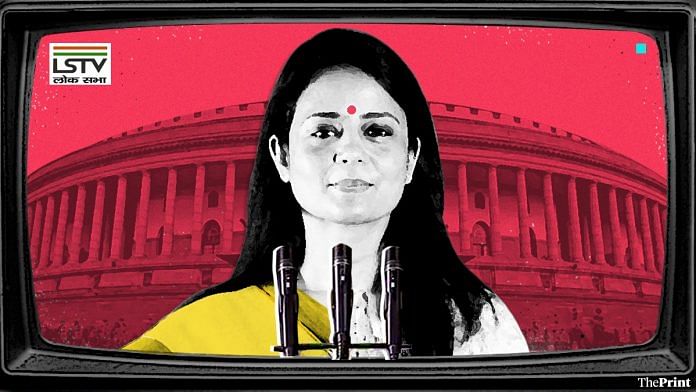New Delhi: Mahua Moitra held court in her Kolkata home right after winning her seat to the Lok Sabha from Krishnanagar in 2019. She was giving interviews to reporters in her home’s garden at twilight, dressed in a white traditional tant sari, resplendent in her victory. Afterwards, as reporters packed up their OB vans parked outside her home, they noticed a young woman in a black dress and heels marching past. It took them a moment to recognise her—it was Moitra, dashing off to a celebratory dinner.
The contrast was striking, and the import obvious: this was a leader who had a life beyond politics.
And it is this life beyond politics that has tied Moitra’s political life into knots.
The Bengali firebrand who sees herself as a relentless crusader against cronyism and authoritarianism is battling her biggest controversy yet. It’s been branded the cash-for-questions scam. She isn’t the first Member of Parliament in India or the world to face such allegations—but what’s on trial is more than just the questions she asked, or the favours she allegedly received. Her entire life’s choices are on trial. This trial by fire began just as Durga was invoked during Durga Puja, and her first public statement to a string of allegations against her was accompanied with “Jai Maa Durga.”
“Women leaders are not supposed to have private lives as such. And if they do, it must be in the conventional sense. Just the fact that a woman can have a boyfriend and also get into politics is jarring for society,” said Proma Raychaudhury, who teaches political science at Krea University. “Photos of a woman leader enjoying parties or in a public romantic relationship unsettles the image that voters have that women leaders should be dedicated to serving public interest. It’s quite concerning,” the professor added.
This is a story of a woman parliamentarian, a lawyer, a businessman, and a dog — and the dog is the opening act that made the personal political.
A male politician’s private way of life doesn’t stand in his political path. But Mahua’s does——Proma Raychaudhury, a teacher of political science
On 17 October, BJP MP Nishikant Dubey alleged that Moitra was involved in a “cash for query” case whereby she accepted “cash” and “gifts” to pose questions in Parliament on behalf of the Hiranandani Group. Dubey further alleged that Moitra had provided her login details for the Lok Sabha website to Darshan Hiranandani in order to post questions on her behalf. These claims seem to originate from Moitra’s ex-boyfriend, Supreme Court lawyer Jai Anant Dehadrai. Moitra has described all allegations as an “elaborate smear campaign” and a “badly set-up hit job to try and kick me out of Parliament for six months.”
It all began with cropped images of her smoking and enjoying herself at parties splashed across social media on a Sunday. Lutyens’ Delhi just could not handle it, for all its swish set. A politician, and a female one in particular, just has to look and live differently, reflecting the heavy burden of Gandhi’s shadow on Indian politics. Living well is frowned upon.
Most amused to see some personal photos of me being circulated on social media by @BJP4India ‘s troll sena.
I like green dress better on me than white blouse. And why bother cropping – show rest of the folks at dinner as well.
Bengal’s women live a life. Not a lie.
— Mahua Moitra (@MahuaMoitra) October 15, 2023
Moitra is a sharp contrast to her party leader Mamata Banerjee’s deliberate dressed down choices. Delhi is rife with rumours about her large circle of friends, and the very public custody battle over her pet dog Henry. WhatsApp forwards make lurid claims about her love life: some paint her as a man-eating femme fatale, others as a woman scorned.
Indian politics is no stranger to sleaze. Comparisons to other male politicians are on the tips of several tongues—whether within her party or in national politics. Men still get to live life on their terms, while women leaders have to be part of the handloom sari brigade, silently relegated to the corners of group photographs.
Moitra is known for not backing down from a fight. She has doesn’t pull her punches, and has asked the BJP government several uncomfortable questions. Her fiery speeches in Parliament, beginning with her maiden ‘7 signs of fascism’ speech, have repeatedly gone viral, as have her choices of handbags and handlooms. She’s a fixture in national newspapers — even though she has insulted journalists in Bengal. She has even appeared on the cover of Harper’s Bazaar.
Women leaders are not supposed to have private lives as such. And if they do, it must be in the conventional sense. Just the fact that a woman can have a boyfriend and also get into politics is jarring for society—Proma Raychaudhury
Her party, the TMC, is yet to make a comment on the allegations against her. Industrialist Darshan Hiranandani — who Moitra regards as a friend — released a statement saying that he had Moitra’s Lok Sabha credentials. Moitra has said he probably made the statement under duress, which Hiranandani has denied. Both Dubey and Dehadrai have deposed in front of a Parliamentary Ethics Committee on 26 October.
In the meantime, her private life in the public eye is in the spotlight. Her credentials — as a former vice president of JP Morgan who left the high–rises of New York and London to work at the grassroots in West Bengal — have taken a back seat to the whisper network, which paints her as a loud, Louis Vuitton-loving, female Lothario.
“She is a hard-working and skilled parliamentarian, a highly effective debater and very popular among her colleagues. She stands out as an MP whose impact exceeds party or issue,” Congress MP Shashi Tharoor told ThePrint.
“I regard her as a good friend, a generous soul and a courageous spirit. These are qualities that transcend the headlines of the day,” added Tharoor. “I’m sure that when this crisis passes, she will continue to be a valued figure in our country’s politics and public life.”
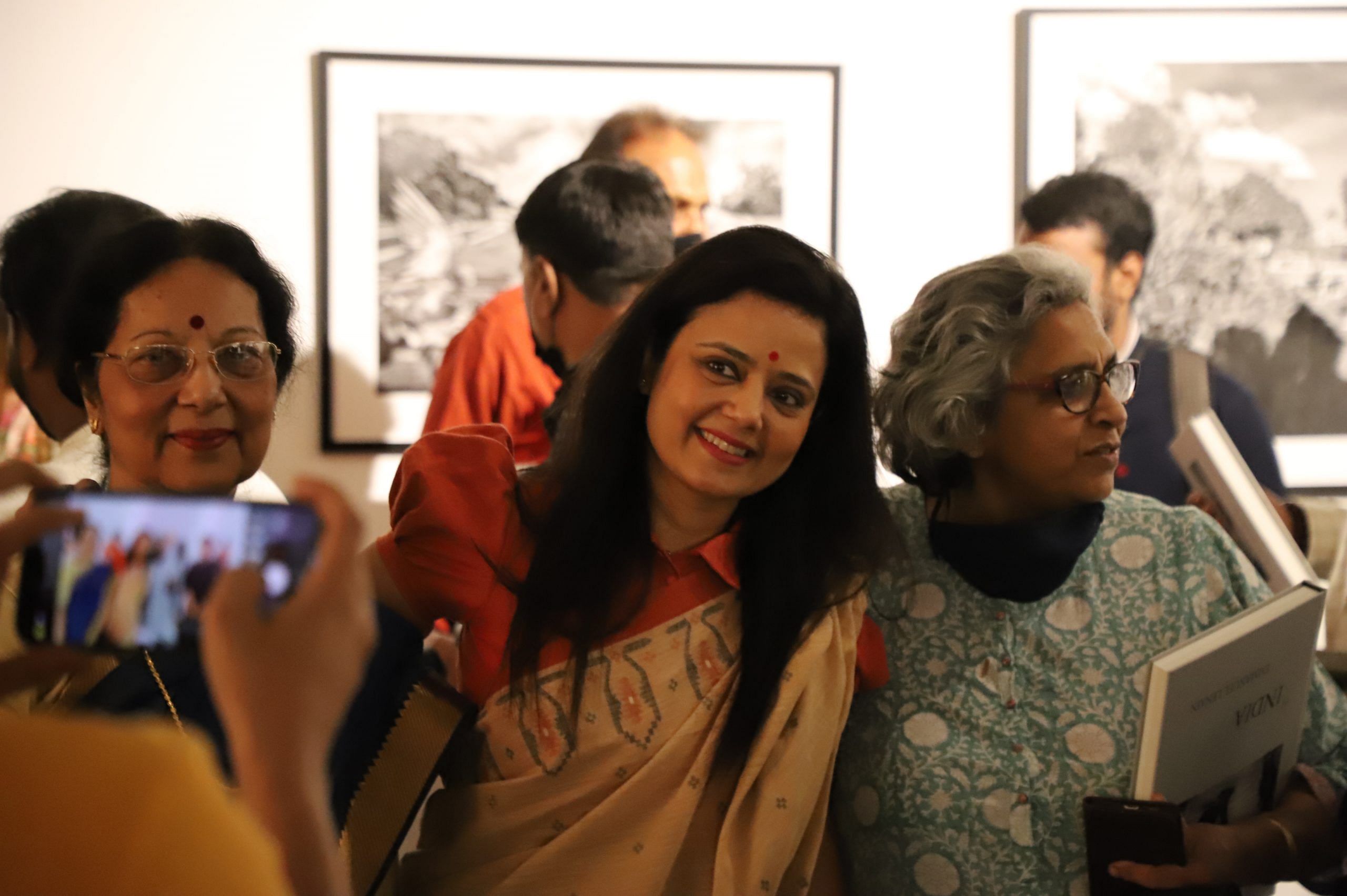
Also read: When Mahua Moitra speaks in Parliament, Lok Sabha TV goes from low definition to Ultra HD
Politics vs public life
Moitra was in politics for a decade before she shot to fame in 2019 with her first parliamentary speech outlining the early signs of fascism. The speech, a reference to a poster displayed at the United States Holocaust Memorial Museum, caught both national and international attention.
It was a sign of the fire that forged her — Moitra was using global frames of reference to articulate politics in India.
Born in Assam, she studied in Kolkata before winning a scholarship to Mount Holyoke College in the US, a small private liberal arts women’s college with a strong tradition of feminist activism. Holyoke is part of the Seven Sisters colleges — a group of historically women’s colleges in the US — and counts incredibly accomplished women among its alumni, including poet Emily Dickinson, abolitionist and suffragette Lucy Stone, and Frances Perkins, the first woman to hold a US Cabinet position.
After graduating from Holyoke in the Class of 1998, Moitra worked as an investment banker at JP Morgan, first in New York and then in London. But her decision to be a banker “basically just happened,” and she has said that she “wasn’t a burnt-out banker,” and had “great time as a banker.” She quit her corporate life in 2008, having climbed the ladder to vice president.
But when she attended her Holyoke ten-year-reunion, she decided that this was not the path she wanted her life to take. She desired actual change, and this triggered her decision to join politics. She cites Indira Gandhi and Margaret Thatcher as her role models.
Even Karan Thapar described her as “the most un-neta like politician I have ever seen,” in an interview with her, saying “the lady sitting in front of me is so obviously avant-garde, strikingly dressed, extremely confident and very cosmopolitan…”
Her first stint was as one of Rahul Gandhi’s ‘Aam Aadmi Ke Sipahi’ campaign in West Bengal in 2009. But after bumping into Mamata Banerjee on a flight in 2010, she decided to join the TMC and was appointed party spokesperson.
“There was always a lot of curiosity around Mahua Moitra, from the very beginning,” said veteran journalist and political analyst Rasheed Kidwai. She was seen as “Rahul Gandhi’s find,” which interested a lot of people in political circles. She was also a complete outsider, without any local roots, which made many interested in her perspective.
Moitra had to lay down her roots and build her vote base. She started from Karimpur, a rural constituency bordering Bangladesh at a time when India-Bangladesh border areas were a hot political button.
“When she was given the Karimpur Assembly seats in 2016, we all thought it was one of those “punishment” seats which no one expects you to win,” said senior journalist Monideepa Banerjie. “Karimpur is a remote seat away from the glare of the Kolkata-based media and it was a hard-core Left bastion for decades. How Moitra swung that around was astonishing.”
Moitra rented a house and lived in Karimpur, which is nearly 200km away from Kolkata. She spent time with local residents, understanding their issues. She won that assembly election by 16,000 votes, and was elected to the West Bengal assembly under the Trinamool symbol.
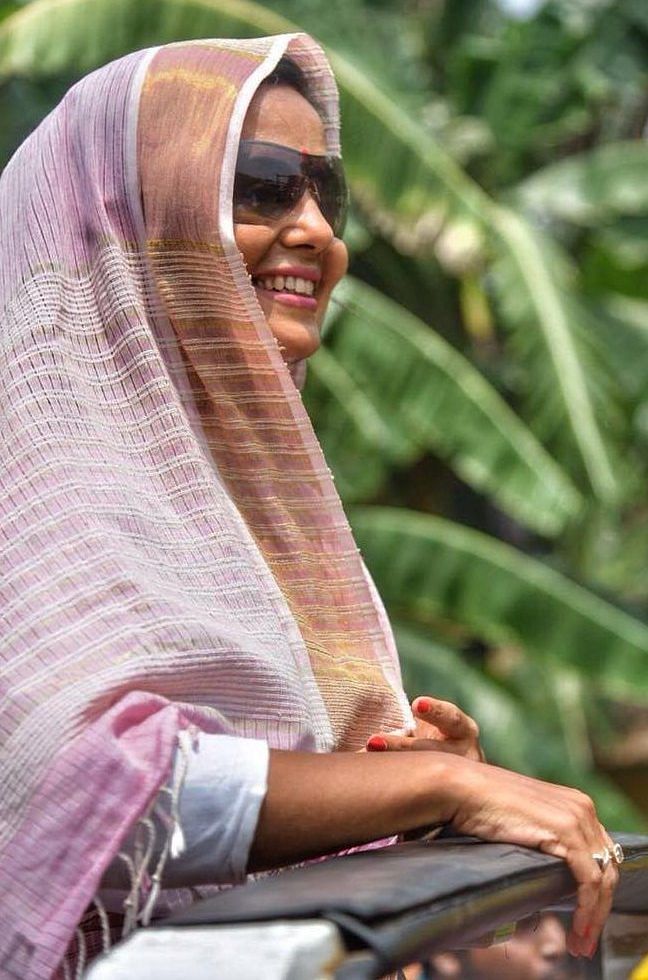
“She ran a great campaign. I was struck by how she seemed to have adopted the persona of Sonia Gandhi for it,” said Banerjie, describing videos of Moitra on the campaign trail. “The way she dressed, the way she walked, her interactions with voters — it was like watching Sonia Gandhi doing a door-to-door. I don’t know if it was planned that way but Mahua is that kind of person, who would adopt and execute a strategy like that. It obviously paid off.”
That impression, however, didn’t translate to the way Moitra was seen in the media: the Anandabazaar Patrika ran a headline calling her a “Memsahib,” zeroing in on her giant sunglasses and her Louis Vuitton handbag, while another magazine declared her “the most charming woman in Kolkata”. For the media, her accessories spoke louder than her words.
By 2019, she was more seasoned — but still a political understudy. Journalists remember what it was like when she got a TMC ticket to contest the Lok Sabha election: like a schoolgirl had been handed the moon, or like a kid in a candy shop —not like a cool executive from JP Morgan.
Her campaign from Krishnanagar, though, was different. She was more in control of herself, and unafraid to take people to task for coming late, scold party bikers for not maintaining distance from her cavalcade, and get out of a traffic jam by hailing a to-to. Draped in a red and blue Shantipuri sari worn over a white t-shirt, she looked the part of a politician from a rural constituency, despite being largely perceived as a foreign-return modern woman.
When local TMC workers insisted on Moitra visiting their areas as well, she exasperatedly said, “Panchayat vote e jokhon darabo, tokhon prottek ta baari jabo” (when I stand for the Panchayat elections, I’ll go to each house).”
She was careful to use a rundown public restroom, making a pitstop in her SUV. This is a practice she’s known for, a way to connect with people and dispel the perception of her as an Anglicised, westernised, urban woman.
In a 2019 interview, Moitra said she doesn’t try to reconcile her two worlds. “I’m equally comfortable in both worlds. I’m a multi-faceted person. There are certain things I enjoy and there’s no reason to hide that. For me, I’m at ease in London and I’m at ease in Nadia.”
But the “elitist” tag has haunted her throughout her political career, no matter how hard she has tried to get rid of it.
Also read: ‘Memsahib’ Mahua Moitra is bringing what Indian Parliament never had: a call out culture
Politics’ favourite sexist punchline
Moitra walks a tough tightrope between rural West Bengal and Lutyens’ Delhi.
It’s a delicate balancing act, considering all her complexities. She is an artful dodger and a serious politician, but one who also enjoys luxury. She delivers impassioned speeches in Parliament and files police complaints for custody of her dog Henry, whom she shares with her ex boyfriend. She is determined to fight against the Modi government and its ties to Adani, all the while maintaining a glittering social life filled with corporate friends and fans. She never wears flats, only heels and sneakers. As a single woman, she takes pride in her appearance and fearlessly calls out sexism.
But this tightrope walk isn’t unique to her. Many women in Indian politics have faced similar challenges.
Dr Raychaudhury says there are several cultural demands placed on women leaders. Her research on women political party workers found that single women have a greater chance of climbing the political ladder.
One significant expectation is that women, regardless of their political ideology, must live in an “austere fashion” because politics is largely about appearance, and respectability can be easily tarnished. This means women must dress modestly, in simple saris, live a disciplined life, and always appear “prim and proper” to be taken seriously in politics.
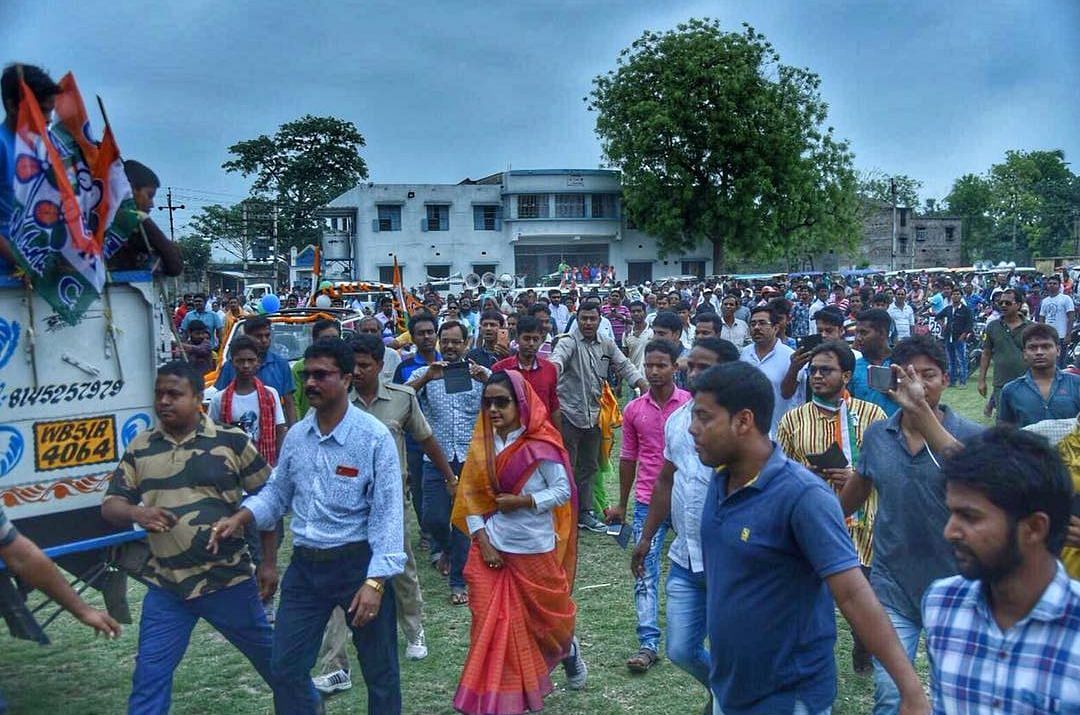
Moreover, women’s private lives are held to a patriarchal double standard. Former Prime Minister Indira Gandhi, for example, is arguably one of India’s most authoritarian leaders, but she was still subjected to plenty of sexist remarks and comments about her life when she entered politics. Sonia Gandhi was also criticised despite being austerely presented as Rajiv Gandhi’s widow.
And it’s a global malaise. Former Finnish prime minister Sanna Marin was brutally dragged through the mud for going to clubs while in office. She’s still branded the “Party PM,” despite the fact that she was the world’s youngest serving prime minister until her defeat to the conservative opposition.
“A male politician’s private way of life doesn’t stand in his political path. But Mahua’s does,” said Raychaudhury.
What puts a target on Moitra’s back is the fact that she’s extremely vocal and visible, unapologetic and unabashed about it. While there is an impetuousness to some of her statements, there’s also a conviction that can translate as arrogance.
Other political leaders from her own party, like Nusrat Jahan and Mimi Chakraborty, aren’t held to the same standards. While film actors who enter politics face their own set of perceptual challenges, both Jahan and Chakraborty have managed to stave off controversies and largely toed the party line. Even Mamata Banerjee, who is also a single woman, is not in the public eye in the manner that Moitra is. Banerjee is seen as a tough street-fighter who doesn’t tolerate nonsense, owning the “austere fashion” that Moitra pays no attention to.
But the TMC chief is also called Didi, adding a relational dimension to the way she’s seen in public by men. It’s similar to how Jayalalithaa was called Amma, or how Mayawati is Behenji, with her diamonds and purses becoming anathema too.
“Lots of politicians lead very complex and hypocritical lives,” said Kidwai. “When it comes to women, they’re subjected to more scrutiny than men. In Mahua’s case, she’s always been open about expressing herself — which adds to the buzz around her. But in retrospect, it’s all being held against her.”
Journalist Banerjie added that this is a conflict Moitra lives with: a desi politician with a large social life. A female politician’s personal life has to be smaller than her politics.
“The lives of females in the public arena invariably generate an enormous amount of puerile interest, not just in India, but across the world. The downside is that these vicarious thrills frequently cross the line and degenerate into sexist, obnoxious name-calling,” wrote Shobha De in a column on Moitra in 2019 after her fascism speech. The Asian Age article ran with the headline—“India is ‘drunk’ on Mahua: A political star is born.”
A lot of commentary around Moitra right now can be chalked up to this patriarchal double standard. On social media, her list of alleged lovers is only compounded by her list of luxury goods. But at the heart of it is the discomfiture her presence creates: that of a “shrill”, “fiery”, “single” woman who chooses to project herself as she is.
“There’s a saying in India that if you have a pack of wolves and you’re led by a lion, then the wolves fight like a lion. But if you have a pack of lions and they’re led by a wolf, then everyone dies a wolf’s death,” she said in an interview to Mount Holyoke’s student newspaper. “It’s very important to be the lion that is leading the rest, and you can only do that if you feel it from within.”
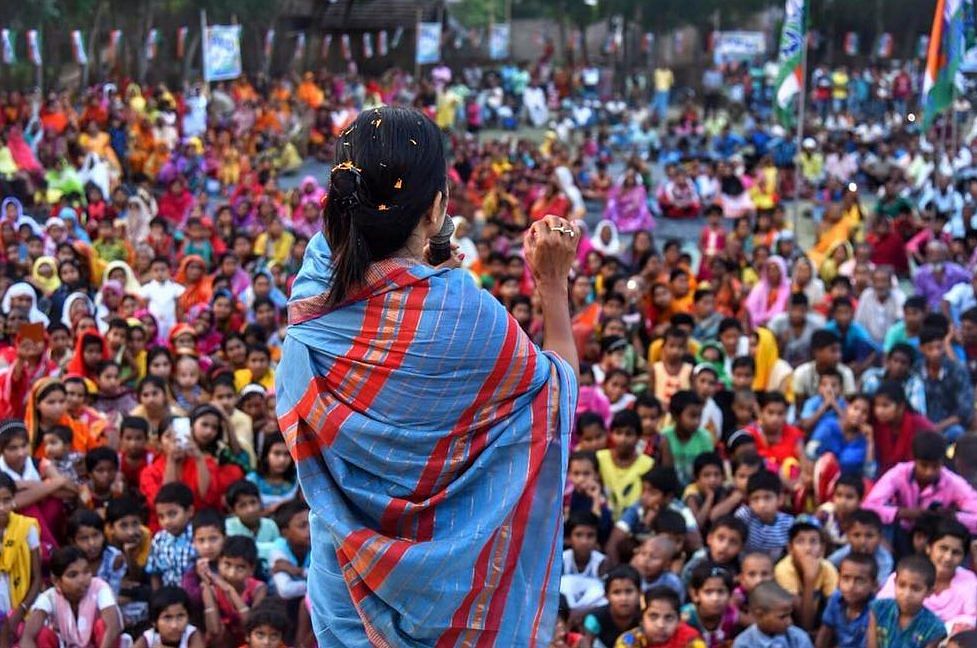
Also read: New MPs Mimi & Nusrat should look to Sarojini Naidu when they get trolled for what they wear
Grabbing controversy by the horns
Mahua Moitra is no stranger to controversies—she’s been there, and done that.
As a spokesperson, she’s best remembered for her alleged gesture of showing the middle finger to an anchor during a TV debate — in a later interview, she said she was simply playing with her ring. She referred to members of the Bengali media as “2 paisa journalists” at a public event in Nadia in 2020, which scarred her reputation, especially in West Bengal: Bengali media took offence to her elitism, and hasn’t forgiven her yet. She’s had FIRs filed against her for allegedly hurting Hindu sentiments by describing Goddess Kali as “a meat-eating and alcohol-accepting goddess”.
Earlier this year, she purportedly used unparliamentary language against BJP MP Ramesh Bidhuri in the Lok Sabha. Before that, there was another row involving her attempt to “hide” her Louis Vuitton bag from cameras in Parliament.
However, through it all, Moitra has been unapologetic and sometimes even belligerent. After the TMC distanced itself from her Kaali comment, Moitra unfollowed the party’s account on X (Twitter).
And she’s been at loggerheads with TMC leadership too: she was dropped as Nadia district president after a brief stint in 2020, and has been publicly pulled up several times. It’s not unsurprising that the party has kept the controversy at arm’s distance.
“We are treading with caution,” said a TMC MP. “When Partha Chatterjee was caught with cash, the party didn’t stand up for him. He was, in fact, dropped from all government and party positions. We believe in ‘innocent until proven guilty’. If it is true that her login credentials were with Hiranandani, then that is a breach of parliamentary ethics. How do we defend her? But it is equally true that many MPs have shared their login IDs with other people. How else will the MPs function?” the leader added.
Another TMC MP said that it wouldn’t be untrue to call Moitra an “individualistic politician”.
“But we also have to examine why most privilege notices are issued against leaders of the opposition. We also have to look at the circumstances. Her photos were leaked and cropped by a former friend. There is an element of personal vendetta here as well. But the party cannot rush to her side at this hour. We can advise her on how to go about it. We can tell her to hold a press conference or issue statements, but ultimately it is something she would have to individually defend,” the MP said.
A ‘jack-in-the-box’ without a godfather
The other aspect to Moitra’s political life is that she’s an “outsider” to Indian politics—someone from a very global, corporate background who hasn’t yet shed that image.
And her voice rings loud and clear in Parliament, even though she’s not a central figure in West Bengal politics. She regularly gives speeches, ranging from remarking on the BJP government’s actions to highlighting public welfare issues and environmental impacts.
Her speeches are even the subject of a Master’s thesis. The thesis analyses twelve of her parliamentary speeches between 2020-21, and finds that they are all “distinguishably ‘non-female centric’.” Instead, the issues her speeches raised affect citizens of the nation at large.
“In this aspect, Moitra has positioned herself as one raising issues of general public interest in the Parliament and not those that only impact a specific gender,” writes scholar Priyanka Vishwas Padole in her thesis. As part of the study’s limitations, Padole lists lack of existing research on “how other contemporary female MPs are approaching the existing perceptions and challenging limitations placed on female politicians.”

Moitra’s fellow parliamentarians describe her as a “jack in the box” with wonderful oratory skills who may be suffering because she “doesn’t have a godfather” in politics.
“This would not be happening to a Kanimozhi or a Supriya Sule. It is difficult for an opinionated, single woman to survive in politics without a godfather,” said a Lok Sabha MP.
“But the problem with Mahua is also that she gets too carried away by the echo chamber and the media attention. She hasn’t built a second tier support system or a political base who can stand by her at such times. Even the fellow MPs that she’s with are yet to make a statement on her,” said the MP.
A Congress MP also pointed to her closeness to Rahul Gandhi.
“She’s most definitely a jack in the box. She will always be in the front row. Whenever Rahul Gandhi is around, she will act like she is a personal friend. She will take the lead in sloganeering,” said the MP.
“But one also sees why this is a ploy. The Ethics committee asks Nishikant Dubey, who she’s consistently taken on to come before them. But they don’t call Moitra to present her side. If the allegations of sharing her login credentials is true then that’s a tripping point for her. She’s stuck on a slippery slope”, he added.
Also read: Mahua Moitra has asked 62 questions in LS. Here’s what she wanted to know on Adani & Hiranandani
A constant tug-of-war
The tug-of-war in her political life hasn’t been separated from the tug-of-war in her private life.
The “cash-for-questions” controversy was first alleged by her ex-boyfriend, described by several media outlets as a “jilted ex” and “former personal friend.” Dehadrai hasn’t been shy about airing his thoughts on social media, and has posted about her on X several times through the course of their long-drawn out breakup.
And these were the allegations picked up by Dubey, which has snowballed into the moral interrogation of Mahua Moitra.
The unlikely protagonist of this story is Henry the Rottweiler, caught between two people in a former relationship, each of whom insists he belongs to them. Both allegedly run instagram accounts dedicated to Henry. Both have furnished several certificates of proof via the police and investigating agencies. The Central Bureau of Investigation is the arbiter, apparently: in his latest claim, Dehadrai said Moitra had offered to “return Henry” if he withdrew his complaint from the CBI.
Moitra accused Dehadrai of trespassing on her property and stealing Henry, who he later returned. She filed two separate police complaints on the issue — one in March, the other in September — but withdrew both because of her “erstwhile friendship” with her ex. Friends have described her as being extremely indulgent of Henry.
Dehadrai, on the other hand, says Moitra has “deliberately kidnapped and hidden” Henry since October 10 — a week before Dubey exposed the cash-for-query row. Dehadrai made an emotional appeal to the police to help him reunite with Henry as soon as possible.
The saga is being closely followed by the press, piling accusations of emotional cruelty on Moitra’s mounting list of alleged crimes. Videos have been made imploring for Henry’s rescue and return to Dehadrai, and #JusticeForHenry trended on X.
Henry the Rottweiler, however, is yet to give his comment.
(Edited by Prashant)


